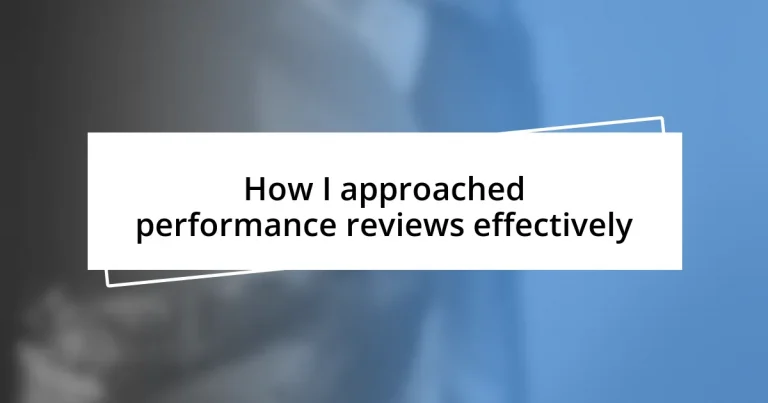Key takeaways:
- Performance reviews are opportunities for growth, emphasizing the importance of self-reflection on past achievements and challenges.
- Preparing for reviews with feedback gathering, goal reflection, and thoughtful questions enhances confidence and constructive dialogue.
- Setting clear expectations and fostering open communication creates a supportive environment, enabling collaboration and a sense of purpose.
- Creating actionable follow-up plans, involving managers, and scheduling regular check-ins ensure effective implementation of feedback and ongoing growth.
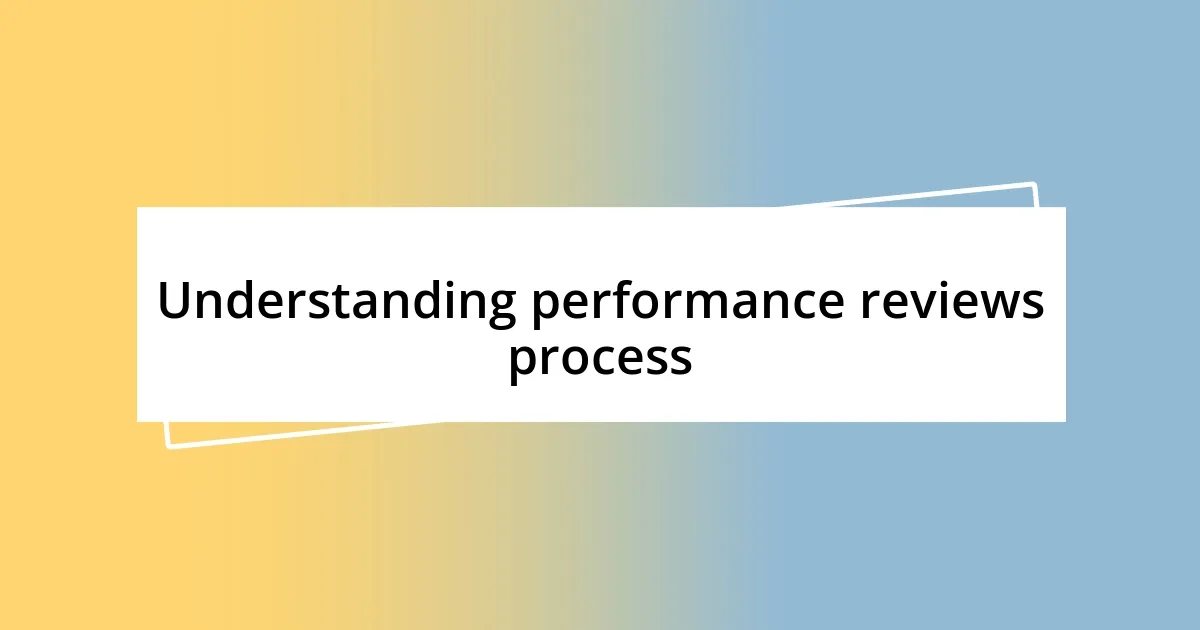
Understanding performance reviews process
Performance reviews can feel overwhelming, can’t they? I remember my first experience with them—it was like diving into a pool not knowing how deep it was. Understanding the performance review process starts with recognizing that it’s not just a checkbox activity but a valuable opportunity for growth.
When I used to prepare for my reviews, I found it helpful to reflect on my achievements and the challenges I faced over the past year. This reflection helped me see the bigger picture and articulate my progress more effectively. Have you ever taken the time to jot down your accomplishments? You’d be surprised how it can boost your confidence and make the discussion feel more like a shared journey rather than a daunting assessment.
Additionally, approaching the review with an open mind is crucial. I recall a time when I received constructive criticism that initially stung. But once I took a step back and viewed it as a chance to improve, my mindset shifted completely. What if I told you that embracing feedback could transform your career trajectory? The performance review process is more than just a formal procedure; it’s a meaningful conversation that can significantly influence your path forward if approached positively.
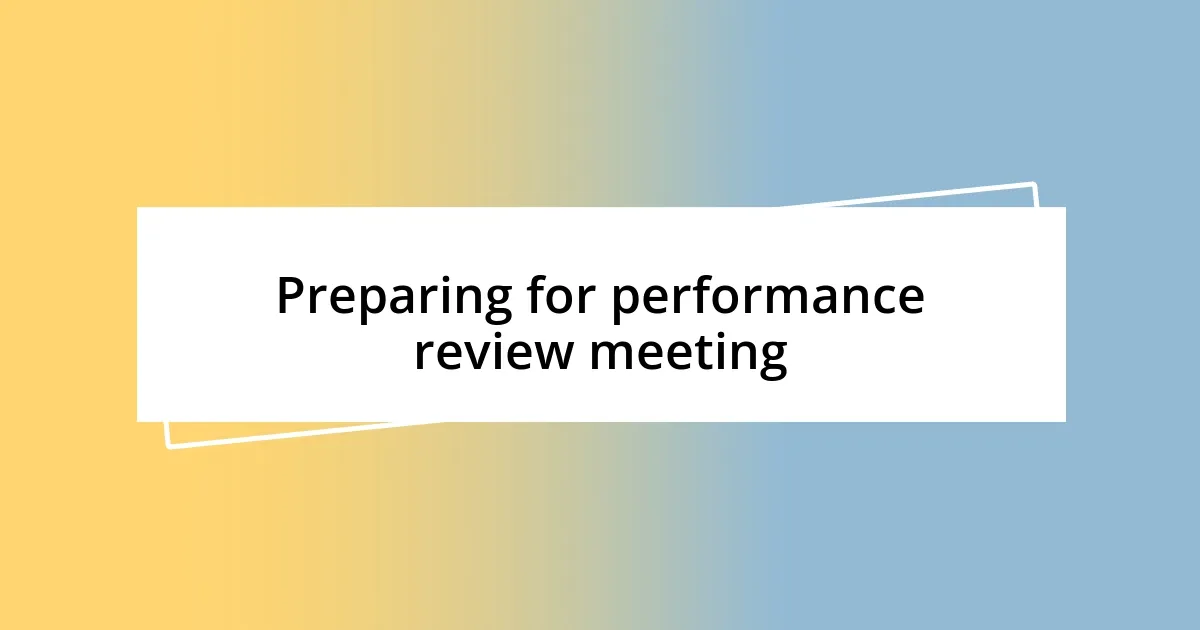
Preparing for performance review meeting
Preparing for a performance review meeting is an experience that can elicit both excitement and anxiety. I recall one particular review when I was unsure what my manager would say. To ease my nerves, I meticulously gathered feedback from my peers and compiled a list of my key accomplishments. This preparation not only boosted my confidence but also ensured I had concrete examples to support my growth during the discussion.
A few days before the meeting, I would also set aside time to reflect on my goals for the next quarter. I found that articulating my aspirations made it easier to engage in a constructive dialogue with my manager. Rather than simply waiting for feedback, I approached the conversation as an opportunity to align my goals with the team’s objectives. Have you ever considered how your professional aspirations can impact the review dialogue? It’s a real game-changer.
Finally, preparing questions for my manager was a critical strategy that I often overlooked in my earlier experiences. I learned that asking insightful questions not only shows my engagement but also opens up avenues for deeper discussion. For instance, I once asked about the company’s vision for the next year, and this led to a collaborative conversation about how I could contribute. How do you envision using your upcoming performance review to not just reflect, but actively shape your future within your organization?
| Preparation Step | Benefit |
|---|---|
| Gather Feedback | Boosts confidence and provides examples. |
| Reflect on Goals | Aligns aspirations with team objectives. |
| Prepare Questions | Encourages deeper engagement and collaboration. |
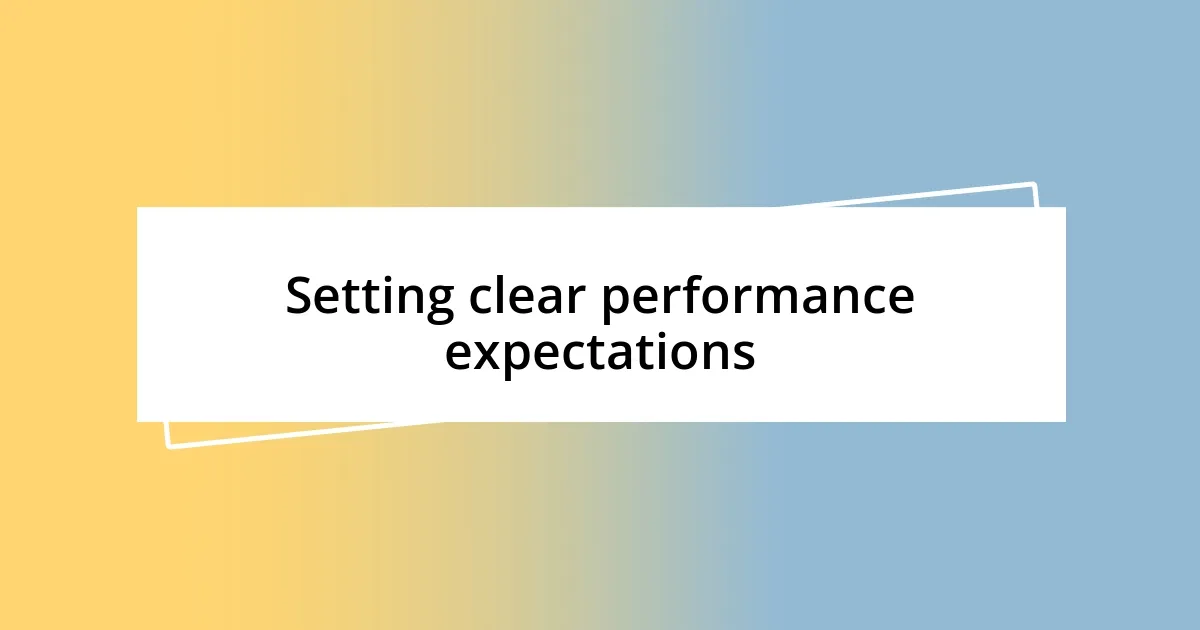
Setting clear performance expectations
Setting clear performance expectations is vital for ensuring everyone is on the same page. I’ve experienced firsthand how clarity can transform a seemingly intimidating review process into a collaborative one. When expectations are spelled out, it not only gives the employee a solid roadmap but also instills confidence in their abilities. I remember a time when my manager laid out specific goals for the quarter. Having those details made my focus sharper and helped me prioritize my tasks effectively.
To set clear expectations, consider the following key elements:
- Specific Goals: Define what success looks like for each role.
- Measurable Outcomes: Use metrics that track progress and make it easier to assess performance.
- Realistic Timelines: Establish deadlines that are challenging yet attainable to maintain motivation.
- Frequent Check-Ins: Make regular updates to keep the conversation flowing and adjust goals as needed.
- Constructive Feedback: Create an environment where open dialogue is welcomed, ensuring employees feel supported.
These components form a strong foundation that not only eases anxiety but can ignite a sense of purpose in employees during performance discussions.

Gathering valuable feedback from colleagues
Gathering feedback from colleagues can be a game-changer as you prepare for your performance review. I remember once asking a colleague I respected what they thought about my contributions to a project. Their insights were eye-opening, highlighting strengths I hadn’t recognized and areas for improvement I hadn’t considered. This approach not only broadened my understanding of my performance but also fortified my relationships with peers. Have you ever thought about how valuable your colleagues’ perspectives can be?
It’s important to create an open environment where your colleagues feel comfortable sharing their thoughts. After all, nobody wants to provide feedback that might be perceived negatively, right? I made it a point to reassure my colleagues that their honest opinions would help me grow rather than put them in a difficult position. This trust ultimately led to deeper, more constructive conversations. Reflecting on your own experiences, how can you cultivate that kind of trust with your team?
Also, don’t underestimate the power of informal chats. I learned that some of the most genuine feedback comes not from structured sessions but from casual coffee breaks. I often found myself surprised by the insights my colleagues offered over a simple cup of coffee. Why not engage in more of these situations? You might be amazed at what you can learn when you approach feedback with an open heart and mind.
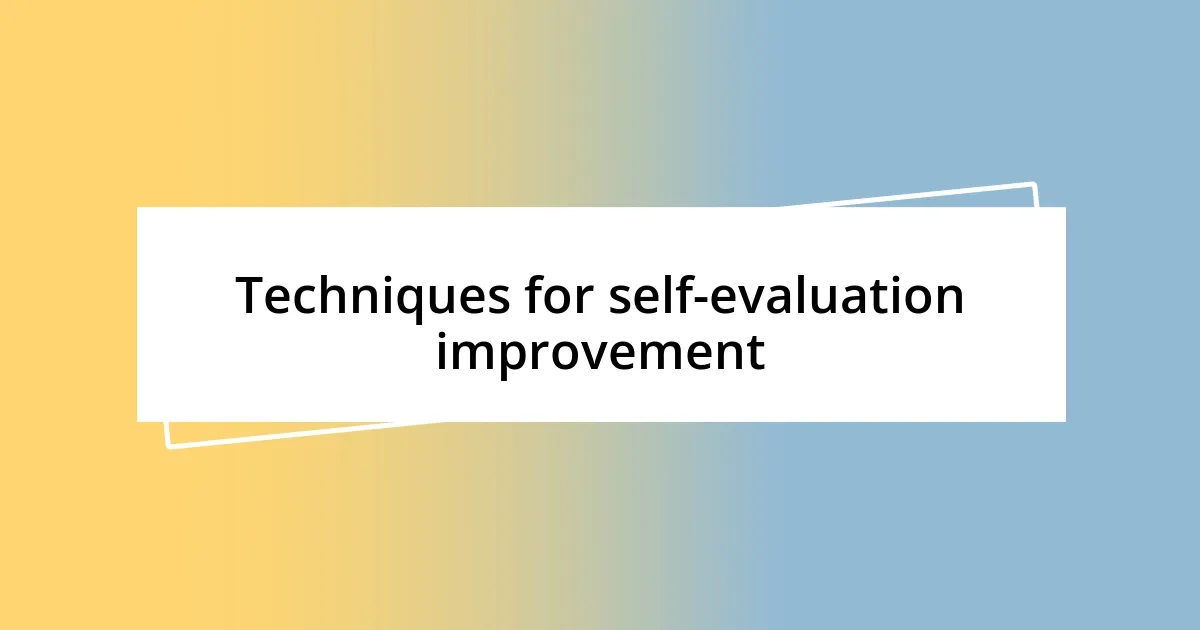
Techniques for self-evaluation improvement
Thinking deeply about self-evaluation can really elevate your performance review experience. One technique that transformed my approach was to maintain a personal journal dedicated to my achievements and challenges throughout the year. I’d jot down my accomplishments, lessons learned, and areas I felt needed growth. This practice not only polished my self-reflection skills but also gave me a treasure trove of insights to draw from during evaluations. Have you ever considered how documenting your journey can clarify your progress?
Another powerful technique that worked for me was role-playing my self-evaluation with a trusted friend. We’d switch roles—allowing them to play the part of the evaluator while I presented my reflections. This mock scenario encouraged me to articulate my thoughts more confidently and anticipate any questions that might arise. It’s fascinating how stepping outside your comfort zone can help you feel more prepared. Can you think of someone who would be an ideal partner for this exercise?
I also found that setting aside time for self-reflection after receiving feedback has been crucial. After a performance review, I took a step back to assess not just the feedback, but my emotional reactions to it. By writing down my feelings and thoughts about the feedback, I realized the areas where I felt defensive and why. This practice opened my mind to understanding not just the information conveyed but also how to respond constructively. Isn’t it enlightening to find growth opportunities even in moments of discomfort?
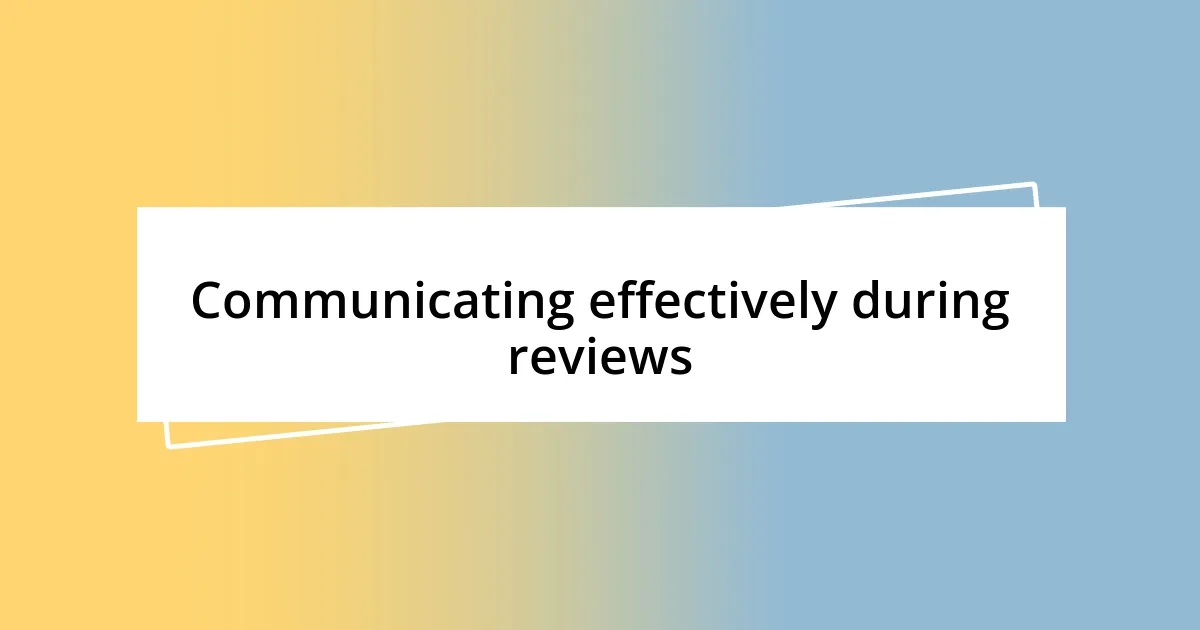
Communicating effectively during reviews
Communicating effectively during performance reviews requires a balance of clarity and empathy. I remember a particular review where I focused on being transparent about my challenges while also celebrating my successes. This honest communication raised the level of trust in the room, making it easier to discuss areas for growth. Have you noticed how vulnerability can actually open up more meaningful dialogue?
I find that framing feedback as a partnership can truly transform the conversation. I once approached a review by asking my supervisor, “How do you think we can work together to tackle the goals we set last time?” This simple question encouraged collaboration rather than a one-sided evaluation. It felt refreshing to shift the focus from merely receiving feedback to actively seeking input on our future path together. What strategies have you found helpful in inviting collaboration during your reviews?
Non-verbal communication is also a crucial aspect I can’t overlook. During my most recent performance review, I made it a point to maintain eye contact and nod in acknowledgment while my manager spoke. This small adjustment in my body language signaled my engagement and openness to the comments being shared. Have you considered how your presence can either enhance or diminish the conversation?
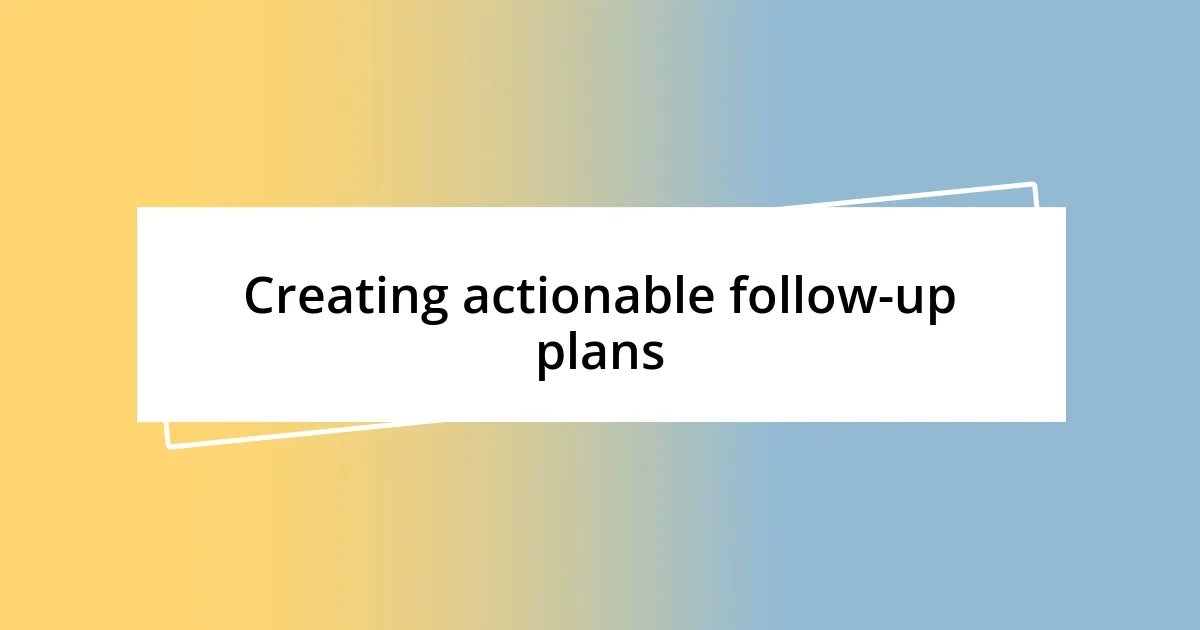
Creating actionable follow-up plans
Creating actionable follow-up plans is fundamental for putting insights gained from performance reviews into practice. After reflecting on feedback, I strive to draft a follow-up plan within days of the review. This plan includes specific, measurable goals and deadlines, allowing me to track my progress effectively. Have you ever felt the weight of feedback dissipate because it wasn’t concretely addressed?
One approach I found particularly effective was involving my manager in this process. Instead of solely creating a plan by myself, I share my goals with my supervisor and ask for their input. Collaborating in this way ensures that both my aspirations and their expectations align. When I did this after a review, my manager suggested a mentorship opportunity that not only supported my goals but also fostered a deeper working relationship. Have you thought about how engaging others might amplify your success?
I also emphasize the importance of regular check-ins to evaluate my progress. Every few weeks, I schedule time to revisit my follow-up plan, celebrating the small wins along the way. This practice keeps me motivated and accountable. There’s something incredibly rewarding about witnessing my growth firsthand. Doesn’t it feel great to pause and acknowledge how far you’ve come?












